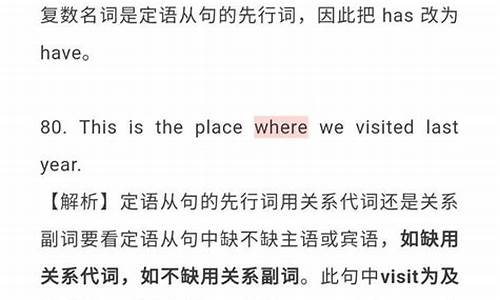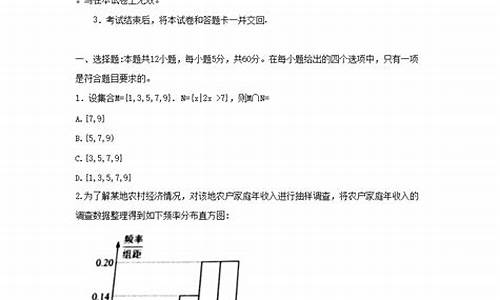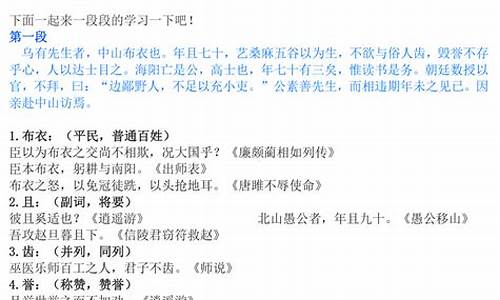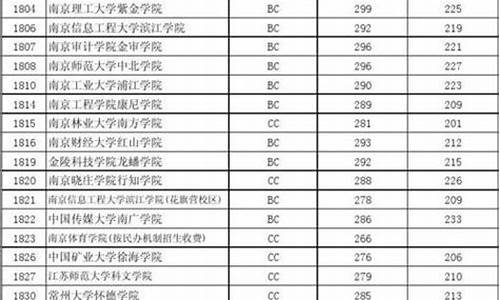英语高考易错题100道,英语易错高考
1.能读懂文章,但高考英语阅读老错,这正常吗?
2.详细列出英语学习中的常见典型错误类型并举例。不用抢答,请想好、归纳好再发。谢谢。
3.高考英语改错常见考点有哪些
4.2018高考英语易错词汇短语辨析1-4
5.高考英语短文改错高频总结
6.高考英语语法:高中英语语法-英语陷阱题4例之三
7.高考英语引导名词性从句辨析

Obsolete
What you think it means: Old, out of date。你以为单词的含义是:旧的,过时的。
What it really means: Not produced, used, or needed。单词的真正含义是:未生产的,未使用的,不需要的。
You’ll see this one in the tech industry a lot. People in tech article comments will comment that a phone is obsolete when they really mean that it’s out of date. The literal definition of obsolete is an item that it isn’t produced, needed, or used anymore. An example of this is is the steam engine. It’s largely inefficient compared to today’s combustion engine and even more inefficient than the emerging electric engines. Thus, steam engines are not used, produced, or needed anymore. Yes, they are also old and out of date, but obsolete is kind of the next step after old and out of date。
这个单词在科技行业经常出现。在科技文章评论中,人们会说某个电话机obsolete(未使用的),其实他们是想说电话机过时了。Obsolete的字面定义是指某物未被生产、不被需要或不再使用。一个例子就是蒸汽机。跟如今的内燃机相比,蒸汽机相当不给力,甚至都比不上新兴的电发动机;因此,蒸汽机是不被使用的、不被生产的或不再被需要的。没错,蒸汽机也是旧的、过时的,但obsolete是“旧”与“过时”更后一步的阶段了。
(来源:新东方在
能读懂文章,但高考英语阅读老错,这正常吗?
错的多无非是几个原因: 1.单词量不够。有些单词没有深层次的理解意思。 2.语法掌握的不牢,特别像时态、语态等方面。 3.做题是前提,但需要在做题时善于总结发现规律,这样下次碰到类似题目时就可以做对。
详细列出英语学习中的常见典型错误类型并举例。不用抢答,请想好、归纳好再发。谢谢。
能够读懂文章但是包括英语阅读总是出错,这很正常,因为高考的英语阅读不是读懂就能够写对的。英语也和语文一样有着各种各样的语法,而且不同的单词组合到一起那就是完全相反的意思,所以大家在写题的时候,很有可能会将阅读理解的题目的意思给理解错了,在这样的情况下出错就变成了一种很常见的现象。所以说在高考的时候一定要注意读题的时候要用心地读,只有这样才能够准确的抓住题目当中的意思。
更深刻的掌握而且阅读理解也不一定是读懂了以后就能够完全理解的,因为有的时候能够懵懵懂懂地读下来,但是整篇文章当中可能错过了一个词,那么整个文章的意思就不一样了。所以说在读阅读理解的时候,也要注意要尽可能地掌握更丰富的知识,只有这样才能够让自己在学习的时候获取更好的成绩,而且在这个过程当中也一定要注意,千万不要随随便便的就忽略各种各样的细节。
多做题如果想要在高考的时候不出错的话,那么在日常学习的时候就需要进行大量的练习英语这门学科,同样也需要通过刷题的方式来维持自己的成绩。只有通过刷题才能够让自己的成绩变得更好一些,所以在学习英语的时候也可以选择刷题,要用最短的速度来理解文章的内容,并且将文章当中的正确答案找出来。
而且在做英语阅读理解的时候,看着题可以选择在文章当中找到对应的原文,在这样的情况下就基本上不会出错了。而且在做阅读理解的时候还可以选择先看一下这道题目的问题,然后带着问题去文章当中找答案,这样就能够节省自己的时间了,所以大家一定要通过多次的练习来让自己掌握得更熟练一些。
高考英语改错常见考点有哪些
2010年高考英语易错点精析
易错点1 名词的单复数形式的误判
典例 —What do you think the should do first?
—They should learn to take as well as share rights in life.
A. grown-up; responsibility B. growns-up; responsibility
C. grown-ups; responsibilities D. growns-ups; responsibilities
错因分析 有些考生以为grown是复合名词的中心词,其复数形式应该在grown后面加-s;另一方面认为responsibility是不可数名词,没有复数形式,从而错选B。其实,grown-up没有中心名词,其复数形式应该在up后面加\|s;同时根据语境可知,responsibility指义务,该单词作"义务,职责"讲时,可作可数名词或不可数名词,故正确答案选C。
复合名词的复数形式一般在中心名词后面加\|s,如:looker-on → lookers-on, son-in-law → sons-in-law;但是当复合名词没有中心名词时,其复数形式是在最后的词后面加-s,如:grown-up → grown-ups; go-between → go-betweens。
易错点2 名词的格的误用
典例 —Look! This is .
—Very beautiful. When did she take it?
A. my mother’s picture B. my mother in the picture
C. a picture of my mother D. a picture of my mother’s
错因分析 考生可能受汉语思维的影响,错选A或B;也可能受英语双重所有格的影响,错选D。根据语境可知,正确答案选C。
my mother’s picture,意为"我妈妈所拥有的照片",暗含"照片上不一定是我妈妈"; a picture of my mother’s意为"我妈妈所拥有的照片中的一张",同样,暗含"照片上不一定是我妈妈"; a picture of my mother意为"我妈妈的照片(照片中是妈妈)";my mother in the picture意为"照片中我的妈妈",暗含"不是真实的妈妈"。
易错点3 名词作定语的误用
典例 —Where does your sister work, Jack?
—She works in a .
A. shop of cloth B. cloth’s shop
C. shop with clothes D. clothes shop
错因分析 有些考生会因为对名词作定语的用法运用不当而错选B。其实,clothes"服装"只有复数形式,而单数形式"布店"应用shop for cloth或cloth shop,因此,根据语境可知,正确答案选D。
名词作定语时一般用其单数形式,然而,名词parents, clothes, sports等,作定语时必须要使用其复数形式。另外,man, woman作定语时,如果中心词是单数,则用其单数形式;如果中心词是复数,则用其复数形式。
易错点4 对不可数名词的应用判断失误
典例 —I find it very difficult to read novel you lent me last week.
—Yes. It’s necessary to have good knowledge of history.
A. the;不填 B. a;不填 C. the; a D. a; a
错因分析 考生可能以为第一空是特指对方上周所借给"我"的小说,故应填定冠词;第二空后面是抽象名词,为不可数名词,不填冠词,于是错选A。然而,此处knowledge之前须用不定冠词,have a good knowledge of意为"对……很了解",是固定搭配,故正确答案选C。
英语中,有些抽象名词,如knowledge, history, failure, success, help, pleasure, surprise, honour等表示抽象概念时,其前面不用不定冠词,如:with pleasure, in surprise等。但是,当表示具体的概念时,其前面须用不定冠词,也可以用其复数形式。
易错点5 对专有名词的应用判断失误
典例 —Do you know Li Ming?
—Li Ming? Which one? I know Li Ming in our class very well. He is Lei Feng of our times.
A. 不填;不填 B. a; a C. a; the D. the; the
错因分析 有些考生可能以为两个空后面的名词都是人名,前面不用冠词,于是错选A。然而,联系语境可知,答话者至少认识两个李明,而特指他班上的那个李明时前面须用定冠词;后一空的Lei Feng由of our times修饰,说明是我们时代的特征,须用定冠词,故正确答案选D。
人名前面加定冠词,指特定的某个人或某个人的主要特征。地名前面一般不用定冠词,但是当指特定某时期的地方或某地的主要特征时,须用定冠词。如:China → the China (of) today; America → the America of last century; the New York of China等。表姓氏的复数名词前面用定冠词表示夫妇两人或全家人,如:the Greens。
易错点6 定冠词与不定冠词判断失误
典例 —When did you meet her last?
—I don’t remember exactly, but I’m sure it was Friday when I went to the shop to buy football.
A. a; a B. 不填;a C. the;不填 D. 不填;不填
错因分析 有些考生可能认为这两个空后面的名词前都不用冠词,从而错选D。其实,指一个特定的星期几时前面须用不定冠词;表示一个足球时,前面也须用不定冠词,故正确答案选A。
表星期几的名词前面一般不用冠词,但是当指某一个特定的星期几时,前面要加不定冠词。球类活动中,表球类的名词前不用冠词;音乐活动中,表乐器名称的名词前须用定冠词。但是,当它们不指活动,而是指具体的某件东西时,须用适当的冠词。
易错点7 冠词与零冠词应用判断失误
典例 —What do you think is the difference between man and woman?
—I don’t think there’s any difference.
A. the; the B. a; a C. 不填;不填 D. a; the
错因分析 有些考生可能认为,表示类别时,名词前面须用不定冠词或定冠词,于是错选A或B。其实,man, woman, mankind的单数表示类别时,用零冠词。因此,正确答案选 C。
除了上述情况用零冠词外,下列几种情况也须用零冠词:表示家人(包括保姆、厨师、家庭教师在内)的名词前,但该类名词的首字母往往大写;表示种类的短语kind of, sort of, type of等后面的名词之前;在as / though引导的倒装让步状语从句中,放在句首的名词前;用by表示交通方式的短语中等。
易错点8 受思维定式的制约
典例 —Remember that where and when two different English question words.
—I see, but can you tell us how to use them, sir?
A. be B. is C. are D. being
错因分析 有些考生没有弄清题意,就想当然地认为用where and when提问时,谓语动词用单数形式,于是错选B。其实,这里是指where和when这两个特殊疑问词,故正确答案选 C。
考生应该从思维定式中走出来,不要被一些假象所迷惑,而应该从实际语境出发,对题目进行仔细的考虑。
易错点9 典型数词的误用
典例
It is not rare in that people in fifties are going to university for further education.
A. 90s;the B. the 90s;/ C. 90s;their D. the 90s;their
错因分析 考生很可能错选B或C。"世纪"和"年代"均为特指概念,故第一个空要用定冠词the,表示特指,如:in the 1980s/1980’s(在20世纪80年代),in the 90s/90’s(在90年代),选项A和C首先被排除;又因为"in one’s+整十的基数词的复数形式"为一个固定的结构,意为"在某人几十多岁时",故 D为本题的正确答案。
考生要注意当表示"几十多岁"时,要用整十的基数词的复数形式来表示。
易错点10 it 用作形式主语及形式宾语时判断失误
典例 I would appreciate if you could come and help me with my work.
A. that B. it C. this D. one
错因分析 很多考生认为this或that可以指代上文或下文所出现的内容,于是误选A或C。其实,用于指代后面整个句子的内容且作形式宾语时,只能用it,于是正确答案选 B。
在英语中,有些动词,如:appreciate, hate, like, dislike, make, put等后面不能直接跟从句,而要用it作形式宾语。
易错点11 it, one, that, those, ones等的用法区别
典例 —Would you like to buy a car here?
—Yes, but I’d like to buy made in Shanghai.
A. one B. that C. it D. this
错因分析 许多考生认为此处应该用it或that指代说话双方所说的车,于是误选B或C。根据语境可知,上海制造了许多小汽车,答话者只想买其中的一辆,故正确答案选 A。
指代上文提到的名词时,it指代上文提到的那个东西,即同类同物;that指代抽象的事物或上文提到的同类事物的另一件东西,可替代可数名词,也可替代不可数名词,表示特指;而one指代上文提及事物中的其中一件,只能替代可数名词,表示泛指。
错点12 the other(s), other(s), another, the rest等的用法区别
典例 I have done much of the work. Could you please finish in two days?
A. the rest B. the other C. another D. the others
错因分析 本题考生易误选D项。其实本题是对the rest用法的考查。选项B、 C均修饰可数名词,选项D相当于"the other+可数名词复数"结构,这三个选项用在本题中都不合适。the rest指代名词时,既可以指代可数名词复数,也可以指代不可数名词。在本题中,the rest指代不可数名词,相当于the rest of the work,故选项 A为本题的正确答案。
当the rest作主语时,谓语动词单复数的使用要由the rest所指代的内容来决定。
易错点13 同级比较的用法易错点
典例
Nowadays the roles of husband and wife are not as defined as before, especially when both partners work and earn money for the family.
A.clear B.clearer C.clearly D.more clearly
错因分析 考生易分辨不清词性而误选A项。根据语法知识可知,as... as... 为同级比较结构,as与as之间要用形容词或副词的原级,故选项B和D首先被排除;又由于此处defined作动词,它要用副词来修饰,故选项 C为本题的正确答案。
在高考英语中,同级比较问题是一个常考点。其结构为:"so/as+玜dj./adv.(原级)+as...",其中的so... as... 结构只能用于否定结构中;而as... as... 结构既可以用于肯定结构中,又可以用于否定结构中,如:
She isn’t as/so nice as her sister. 她不像她姐姐那么好。
易错点14 形容词和副词的一些固定用法的误用
典例—Have you been to New Zealand?
—No. I’d like to, .
A.too B.though C.yet D.either
错因分析 分析句意可知,横线处应填一个表示转折关系的词,选项A和D首先被排除;yet表示转折关系时,后应接一个从句,故选 B项。
though用作连词时,意为"虽然",引导让步状语从句,通常可以与连词although互换,如:
Though/Although they are poor, they are generous.尽管他们很穷,但他们很慷慨。
另外,though还可以用作副词,意为"然而"或"但是",表示转折关系。它位于句尾时,其前通常要有一个逗号;当它位于句中时,其前后通常各用一个逗号,它的这种用法与副词however一样。要注意,although是没有这种用法的。
易错点15 几个情态动词的特殊用法易错点
典例 Don’t play with the dog, Jack, for it be dangerous at times.
A. shall B. should C. can D. must
错因分析 很多考生认为玩狗将很危险或者肯定很危险,从而误选A或D。其实,shall用于第二、三人称表示"允许,命令,警告,威胁"等;should表示"应该";must表示"必须,一定"等;而can除了表示"能,能够"外,还可表示"(有时)会,可能会"等。根据语境及情态动词的意义比较可知,正确答案选 C。
情态动词can在高考英语中的出现率很高,它的其他常考点┤缦陋:
can可以表示能力,表示客观的可能性,表示请示和允许,表示惊异、怀疑、不相信的态度。主要用于肯定句、否定句和疑问句中。用于肯定句中表推测时,指理论上的可能性,并不涉及是否真的发生。
易错点16动词的一般过去时与现在完成时误用
典例 — you read the story?
—Yes. I it at school.
A. Have; read B. Did; read
C. Have; have read D. Did; have read
错因分析 有些考生认为,两个人说话时,所用的时态应该是一致的,于是误选B或C。其实,问话者指的是结果,而答话者虽然强调的是地点,但是地点暗示动作发生在过去,于是正确答案选 A。
动词时态的运用不仅要从时间状语上进行确定,而且还要从地点状语所暗示的时间关系上来推敲。如:
(1)表示过去时间的词或短语:yesterday, last night, last week, this morning, in 2006等。
(2)表示动作发生的地点:at home/school, in the factory, on one’s way to等。
易错点17 动词的一般过去时与过去进行时误用?
典例—What did you do last night?
—I my homework but nothing else. ?
A. did B. was doing C. has done D. had done?
错因分析 有些考生看到上文提及的时间状语last night,马上想到用过去时,于是误选A。其实,从后面的信息"but nothing else"可以看出,回话者强调昨晚一直在做作业,于是正确答案选B。?
过去时表示过去已经做了的事情,常与过去时间状语连用,暗含完成;过去进行时也可与过去时间状语连用,但是强调在过去某时间内一直在做某事,没有做别的事,但不一定完成。如:?
I read the story last night. 我昨晚看了这个故事。?
I was reading the story last night. 我昨晚一直在看这个故事。?
易错点18 忽视标志性的时间状语?
典例—I don’t suppose the police know who did it.?
—Well, surprisingly they do. A man has been arrested and now.? A.has been questioned B.is being questioned?
C.is questioning D.has questioned?
错因分析 考生易误选A项,认为题目中的and为一个并列连词,与其前面的时态应该一致。由题目中的标志性时间状语now可知,横线处应用进行时态,又由于动词question与主语a man之间为动宾关系,故选项B为本题的正确答案。?
注意,并列连词and前后要求接相同的结构,如:?
My cousin went to Canada two years ago. He worked there for a few months and then went to America.?
我堂兄两年前去了加拿大。他在那里工作了几个月,然后去了美国。? 但有时须根据具体的语境来判断(如本题)。?
易错点19 主动语态与被动语态误用?
典例It’s said that a car accident on the highway this morning. ?
A. happens B. happened ?
C. was happened D. has been happened?
错因分析 有些考生认为,物作主语时,句子用被动语态,于是误选C。其实,happen为不及物动词,没有被动形式,故正确答案选B。?
在英语中,不及物动词,如:happen, occur, take place等不能用于被动语态。此外,有些及物动词,如:sell, read, write, wash等可用作不及物动词,主动形式后接副词作状语,表示事物的性质、状况等。如:?
The passage reads easily. 这篇文章容易读。?
易错点20 忽视逻辑关系和语境关系?
典例I in London for many years, but I’ve never regretted my final decision to move back to China.?
A.lived B.was living C.have lived D.had lived?
错因分析 考生很容易误选C项,这是因为考生不了解一般过去时态与现在完成时态的区别。若用C项,原句则表示"目前(说话时),人还在伦敦居住",但这与but分句句意"但到目前为止我也没有后悔最终回国的决定"相矛盾。而选项A表示"过去在伦敦住了多年,现在已经不在那里了",故正确答案为A。?
在英语中,一般过去时态与现在完成时态在用法上有很大的不同。现在完成时态和一般过去时态的主要区别在于前者与现在有关,并且对现在还有一定的影响;而后者仅单纯地谈过去的事情,与现在没有任何联系。?
易错点21 其他一些结构的误用?
典例Sarah, hurry up. I’m afraid you won’t have time to before the party.?
A. get changed B.get change
C.get changing D.get to change?
错因分析 考生很有可能误选D项。在英语中,除了可以用be构成被动语态,也可以用get来构成被动语态,这里的get changed相当于get dressed,意为?"换?衣服"。故答案为A项。get done在很多时候还可以表示不好的事情。例如:?
Be careful when you cross this very busy street. If not, you may get run over by a car.?
易错点22 意义相近的结构混用?
典例He told us an interesting story about himself, why he didn’t succeed that time. ?
A. explain B. to explain C. explained D. explaining?
错因分析 很多考生会认为此处应用不定式结构表示目的,从而误选B。其实,考生没有注意到前后两部分间的逗号,逗号后面部分表示一种伴随状况。正确答案为D项。?
不定式作目的状语时,位于句首,常用逗号与后面句子分开,而位于句末时常不用逗号与前面句子分开。作结果状语时,不定式表示一种出乎意料之外的结果;而动词-ing形式表示事情发展的一种自然结果。如:?
I hurried to the airport, (only) to find that the plane had taken off. ?
我匆匆忙忙赶到机场,结果发现飞机起飞了。?
He was working very hard last year, passing the test successfully. ?
去年他一直努力学习,顺利通过了这个测试。?
易错点23 连词与分词的连用错误?
典例Children will work actively if . ?
A. praise B. praised C. praising D. to praise?
错因分析 有些考生会认为if后要用动词-ing形式,或用不定式表示还未发生的行为,于是误选C或D。其实,这是条件状语从句的省略形式,根据主语与动词的关系可知,孩子们受到表扬,于是正确答案选B。?
在时间、条件、让步、比较等状语从句中,当从句的主语与主句的主语一致,且谓语部分含有be动词时,则可将从句的主语与be动词同时省略。如:?
The old man will be very excited when talking (=he is talking) about his past experiences. She will be unhappy if (she is) criticized. ?
易错点24 with复合结构?
典例With his work on time, he felt very excited. ?
A. to be finished B. to finish C. finishing D. finished?
错因分析 许多考生会认为,"工作"与"完成"之间为动宾关系,从而误选A。其实,不定式表示要做的事情,而过去分词表示已经完成的事情。根据句子内容可知,工作已经完成,于是正确答案选D。?
在"with + n + 非谓语动词"结构中,非谓语动词可以是不定式、动词-ing形式、动词-ed形式等。不定式主动形式表被动意义,暗含将要做的事情;动词-ing形式表示名词发出的动作;动词-ed形式表示名词承受的动作,暗含过去已经完成。如:?
With so much work to do, I’m afraid I can’t go to your party.?
With Li Ping helping me, I finished my work on time. ?
With his pen lost, he borrowed one from me. ?
易错点25 逻辑主语的判断错误?
典例In order to improve English, .?
A. Jenny’s father bought her a lot of tapes?
B. Jenny bought a lot of tapes for herself?
C. a lot of tapes were bought by Jenny?
D. a lot of tapes were bought by Jenny’s father?
错因分析 考生很有可能误选A项或D项。其实,in order to improve English可以看成是to improve English的变形,根据语法知识可知,主句的主语为人,选项C和D可以首先被排除。再由句意可知,选项B为正确答案。?动词不定式的逻辑主语为执行不定式to do这个动作的人或物。动词不定式的逻辑主语可以是句子的主语、宾语,有时还可以是介词for或of的宾语。如:?
Jack is late again. It is typical of him to keep others waiting.
易错点26 独立主格结构的判断错误?
典例Seeing her father, the little girl ran to him, her schoolbag behind her.
A. flying B. flew C. to fly D. was flying?
错因分析 有些考生会把后面部分当做一个句子,而句子缺少谓语动词,于是误选B或D。其实,前后两部分之间是逗号,说明后面部分不是句子。然而,选项C表示还未发生的动作,显然与语境不符,因此正确答案选A。?在英语中,一般说来,非谓语动词作状语时,其逻辑主语就是句子的主语。如果它的逻辑主语不是句子的主语,就必须在其非谓语动词之前加上适当的名词或代词。这样,"名词或代词+非谓语动词"就构成了独立主格结构,在句子中作状语。
2018高考英语易错词汇短语辨析1-4
高考短文改错归纳
词形变化错误。主要是名词复数构成上的错误。
One of their first model was the Silver
Ghost.
We have spent several precious weekend
in learning in the English Club.
All over the world men and woman, boys
and girls enjoy sports.
And that knowledges could change my
life.
There are advantage for students to work
while studying at school.
But one and a half year later, I now
think English is fun to learn.
We’re leaving for our hometowns to spend
the winter vacations.
词性混用错误。主要是介词与动词、形容词与副词等的混用。
It
is a real good chance to have met you here.
Football
is not too badly as long as I watch it with my dad!
In
examinations and in certain kinds of written work, it is dishonest and
foolishly to help or to ask help from others.
She
looked at me serious and said, “It’s bad to tell lies!”
We’d
throw a coin as far as possibly.
It
was complete dead, and I was a few miles far away from anywhere on a cold, wet
day.
介词的漏用、多用、误用。
It
is not surprising that the Silver Ghost was regarded “the best car in the
world.”
They
would have to ask their parents for money or for permission to do things by the
money.
Usually
I just checked the results because I thought it was dull to watch a game in
which players kicked a ball each other.
I
found the game exciting and my dad explained for the rules.
But
for the most wonderful thing about Jack was his musical ability.
I’m
writing to thank you with your kind help.
I
didn’t have to walk far before I found a small house standing on a field with a
light shining from the sitting room.
Thank
you so much for your party at Christmas Eve.
We’re
leaving from our hometowns to spend the winter vacation.
Will
you join in the tourist group organized by our school?
冠词的漏用、多用、误用。
We
have made a great progress.
Many
people enjoy sports by watching the others play.
He
would greet us in a tree outside our bedroom, calling “Hello” as we lay in bed
in a morning.
I
hope you have had wonderful journey home.
I
was a high school student then, from low-income family.
代词方面的误用。这些错误主要是:主格、宾格的混用,物主代词、反身代词的误用,代词的多余,不定代词的错用等。
This
is not surprising that the Silver Ghost was regarded as “the best car in the
world.”
Besides,
the foreign teachers here work hard and try his best to make the activities
lively and interesting.
They
may be very hard to do and you certainly need a lot of will-power to succeed.
Some
students may also save up for our college or future use.
Usually
I just checked the results because I thought that was dull to watch a game in
which players kicked a ball to each other.
My
first one job was to clean the tables in a small restaurant.
And
I came to understand that was not easy to earn money.
谓语动词方面的错误。这类错误主要是:时态、语态、主谓一致等方面的错误。
Charles
Rolls, a car maker, was very interested in Royce’s car, and soon Rolls and
Royce go into business together.
I
wasn’t worried about it until I go to see the doctor.
Since
long ago, many adults and children called their friends together to spend
hours, even days playing games.
One
of them was that they can earn money.
I
was not quite willing to sit down and watched the 90-minute football match.
During
the World Cup in 2002, my dad stays up late just to watch his favorite sport.
We
named him Jack and keep him for about three years.
But
the most wonderful thing about Jack were his musical ability.
I
am very pleased to say that all of us greatly improved our English so much.
Earning
their own money allow them to spend on anything as they please.
Having
fun with their friends make them happy.
非谓语动词方面的错误。这类错误主要是:不定式与动名词和分词的混用,现在分词和过去分词的混用,动词与动名词和现在分词的混用以及不定式带不带to的错误。
In
1907, a Silver Ghost broke the world’s record by drive 14,371 miles without
breaking down once.
Besides,
the foreign teachers here work hard and try their best to make the activities
lively and interested.
When
you’re on a diet you have to stop eat too much even though you are always
hungry.
Since
long ago, many adults and children have called their friends together to spend
hours, even days play games.
In
other words, they help to keep people strong and feel good.
I
found the game excited and my dad explained the rules.
I
still remember going there early and felt anxious about the new world.
He
would also catch the food throwing to him from the other side of the room and
sing happily.
I
didn’t have to walk far before I found a small house standing in a field with a
light shine from the sitting room.
I
knocked at the door and was delighting when a pleasant man opened the door and
listened to my story carefully.
We
are busy prepare for our trips.
行文逻辑方面的错误。这类错误主要是转折、因果、并列关系等的混用。
We
liked the dishes you had cooked but we were happy to learn the English songs
you taught us.
Charles
Rolls, a car maker, was very interested in Royce’s car, but soon Rolls and
Royce went into business together.
I
knocked at the door and was delighted when a pleasant man opened the door but
listened to my story carefully.
He
told me that I’d probably have a heart attack while I started eating less.
Not
all people like to work and everyone likes to play.
Key:
一、1.models? 2.
weekends 3. women 4. knowledge? 5. advantages
6. years? 7. vacation
二、1. really2. badly 3. foolish 4. seriously 5. possible? 6. completely
三、1. regarded as 2. with the money 3. to each other? 4. explained the rules 5. But the most 6. for your kind help 7. in a filed 8. on Christmas Eve? 9. leaving for 10. join the tourist group
四、1.made
great progress 2. watching others 3. in the morning? 4. had a wonderful journey 5. from a low-income family
五、1. It is not?2. try their best? 3. It may
be? 4. for their college 5. I thought it was dull? 6. My first job? 7. it was not easy
六、1. went into business 2. went to see 3. children have called 4. one of them is that? 5. watch6. stayed 7. kept 8. was?9. all of us have greatly? 10.
allows 11. makes?
七、1. driving2. interesting 3. eating 4. playing 5. feeling6. exciting 7. feeling 8. thrown? 9. shining 10. delighted 11. preparing
八、1. and we were happy? 2. and soon 3. and listened to? 4. unless I started? 5. but everyone
高考英语短文改错高频总结
#高考# 导语寒窗苦读十余载,今朝考试展锋芒;思维冷静不慌乱,下笔如神才华展;心平气和信心足,过关斩将如流水;细心用心加耐心,努力备考,定会考入理想院校。以下是 为大家整理的 《2018高考英语易错词汇短语辨析1-4》供您查阅。
第一篇
no one,nobody与none的用法区别
1、no one=nobody,两者均只能指人不指物,其后通常不接of短语,作主语时谓语用单数;而none 既可指人也可指物,其后通常接of短语,用作主语时,若指不可数名词,谓语只能用单数,若指可数名词,则谓语可用单数(较正式)也可用复数(用于非正式文体):
No one [Nobody] likes it. 没人喜欢它。
None of the food was left. 一点食物都没留下。
None of the books is [are] interesting. 没有一本书有趣。
2、none 往往暗示有一定的范围(这种范围通常就表现在其后的of短语上),而 no one 或 nobody 则不暗示这种范围(同时也不接表范围的of短语)。比较:
“Did any of your friends come to see you?” “None.” “你的朋友当中有谁来看过你吗?” “一个也没来。”(None为None of my friends之略)
“Did anyone come to see you?”“No one.” “有人来看过你吗?”“谁也没来。”
3、none 有时暗示一种数量,即指数量上“一个也没有”,而 no one 或 nobody 则往往表示一种全面否定,即指“谁都没有”,所以在回答 how many 或 how much 的提问时,通常用 none,而在回答 who 的提问时,通常用 no one 或 nobody.
第二篇
-ed形容词和-ing形容词的用法区别
原则上说,由-ed分词转化来的形容词表被动含义,由-ing分词转化来的形容词表主动含义:
a broken heart 破碎的心(=a heart that has been broken)
an interesting book 有趣的书(=a book which interests readers)
falling leaves 下落的树叶(=leaves that are falling)
Everyone was moved by the moving story. 大家都被这个感人的故事感动了。
You may be worried if you have worrying problem. 假若你有一个令人担忧的问题,你可能感到担忧。
关于-ed形容词和-ing形容词的用法,有的人认为-ed形容词只用于人,-ing形容词只用于物,此说法尽管对读者来说记忆方便,而且在许多情况下也是可行的,但由于说得太绝对,在许多情况下却是不可靠的。
如-ing 形容词用于人的情况就比比皆是:假若你的老师说话幽默、讲课生动,那么不仅他的课非常interesting,而且你会说他是一个 interesting man(有趣的人)。比较:
I‘m interested in interesting people. 我对有趣的人感兴趣。
He was worried about his worrying son. 他为他令人担忧的儿子感到担忧。
He was annoyed with the annoying person. 他对这个讨厌的人很生气。
另一方面,-ed 形容词用于指物的情况也不少见。比较并体会:
a frightened look 害怕的表情(指带有这种“表情”的人感到害怕)
a frightening look 吓人的表情(指这种“表情”令人害怕)
an excited talk 心情激动的谈话(指“谈话”的人心情激动)
an exciting talk 令人激动的谈话(指听“谈话”的人心情激动)
「注」并不是所有-ed 形容词都表被动,有的-ed可能表示完成或其他意义:
fallen leaves 落叶,an escaped prisoner 逃犯,a learned professor 博学的教授,an aged man 老人。
第三篇
neither…nor…的用法
neither…nor…,其意为“既不…也不…”、“…和…都不”:
I have neither time nor money. 我既无时间又无钱。
I neither smoke nor drink. 我既不抽烟也不喝酒。
He neither knows nor cares what happened. 他对所发生的事不闻不问。
This is neither my fault nor yours. 这既不怪我,也不怪你。
「注」通常应连接两个相同性质的句子成分,但有时后一成分可能省略与前一成分相同的词。若连接两个成分作主语,其谓语通常与靠近的主语保持一致:Mary neither likes maths nor (likes) history. 玛丽既不喜欢数学也不喜欢历史。
Neither Jim and Jack was at home. 吉姆和杰克都不在家。
但在非正式文体中也可一律用复数:Neither Jim and Jack were at home. 吉姆和杰克都不在家。
第四篇
have been to和have gone to的区别
两者均可后接地点,前者表示去过某地,通常可与表示次数的状语连用;后者表示到某地去了,强调说话的当时去某地的人不在场。如:
1. have been to 用例:
He has been to Paris three times. 他去过巴黎三次。 They have been to the zoo. 他们到动物园去了。
The children have gone to play in the park. 孩子们到公园玩耍去。
2. have gone to 用例:
He has gone to Paris. 他去巴黎了。 Everyone has gone home. 大家都回家去了。
He has gone to see her uncle. 他去看他叔了。She has gone to the cinema with her boyfriend. 她与男朋友看**去了。
高考英语语法:高中英语语法-英语陷阱题4例之三
高考英语短文改错高频错误总结
老师叮咛:李辉老师说 , 所谓聪明都是小聪明,而真正的智慧,就是能够学会去发现各种规律 。 君子性非异也,善假于各种规律也 。 因此,学 会找到规律 ,至关重要!本文也将通过对 短文改错高考高频考点总结 来 帮助 同学 找到规律 。下文经过了全网首席高考英语名师李辉老师团队高度认真的整理校对 , 无错 、 可信 ! 供全国各省高中生打印 、 学习 、 背诵 。
1.many与much混淆
eg:(2014全国卷2) We did not need to do so?many(much)homework.
2.时态问题
eg:(2015全国卷1) I think(thought)would be happy.
3.名词单复数问题
eg:(2014全国卷1) Since then for all these year(years),we have been allowing tomatoes seed where they please.
4.before与ago混淆
eg:(2014全国卷1) Nearly five years before(ago),and with the help of our father ,my sister and I planted some?cherry tomatoes in our back garden.
5.主被动问题
eg:(2017全国卷3) About one month after this photo was took(taken),I entered my second year of high school and become a new member of the school music class.
6.形容词,副词混淆
eg:(2014全国卷1) We are growing wonderfully(wonderful)tomatoes at no cost!
7.somewhere与everywhere 类似这种逻辑混淆
eg:(2014全国卷1) As a result ,the plants are growing somewhere(everywhere).
8.主语/代词混淆
eg:(2016全国卷2) If we go on a trip abroad,we can broaden you(our)view and gain knowledge we?can not get from books.
9.here与there混淆
eg:(2018全国卷1) Last winter when I went here(there)again,they had a big separate house to raise dozens of chickens.
10.all与both混淆
eg:(2017全国卷2) Mr. and Mrs. Zhang all(both)work in our school.
11.原级比较级最高级混淆
eg:(2018全国卷3) I was afraid to speak in front of a larger(large)group of people.
12.冠词用错
eg:(2014全国卷2) There are all kinds of the(删去)flowers and trees around the classroom buildings.
13.介词后加动名词
eg:(2015全国卷2) After loos(looking)at the toy for some time,he turned around and found where his parents were missing.
14.so与 such的误用
eg:(2016全国卷3) However,my parents didn't seem to think such(so).
15.并列结构
eg:(2017全国卷1)“Speed up!”“Slow down!”“Turning (Turn)left!”
16.another与other混淆:another+单数,other+复数
eg:(2018全国卷1) The first time I went here,they were living in a small house with dogs,ducks and another(other)animals.
17.对于添词,一般添在名词前
eg:(2015全国卷2) Five minutes later,Tony saw his parents.
18.基数词序数词混淆
eg:(2017全国卷1) In the summer holiday following my?eighteen(eighteenth)birthday,I took driving lessons.
19.反身代词混淆
eg:(2018全国卷3) I had done myself(may)homework,but I was shy.
20.从句连词混淆
eg:(2015全国卷2) After looking at the toy for some time,he turned around and found where(that)his parents were missing.
eg:(2017全国卷3) In their spare time,they?were interested in planting vegetables in their garden,that(which)is on the roof top of their house.
21.虚拟语气的错误:一坚持二命令三建议四要求+(that)+sb+(should)do
eg:(2016全国卷2) Some classmates suggest we can(去掉)go to places of interest nearby.
22.Beside与besides的错误
eg:(2017全国卷2) Beside(Besides),they often get some useful information from the Internet.
23.to do形式弄混以及情态动词+do
eg:(2018全国卷1) As a kid,I loved to watch cartoons,but no matter how many times I asked to watching(watch)them,my parents would not do(去掉)let me.
24.非谓语动词混淆
eg:(来源典型例子) We should not leave the tap water run(running)or waste any materials in the laboratory class.
[if !supportLists]25.?[endif]对于改错常用的固定搭配
play+球类 ?
in the Us
tear……apart
in English
On(去掉)last this Thursday
leave……for
play……with
dream……of
eager……to
with the help of
with the development of
time for
enter into
in the countryside
be amazed at
高考英语引导名词性从句辨析
《高中英语语法-英语陷阱题4例之三》由留学liuxue86.com我整理。本内容整理时间为05月12日,如有任何问题请联系我们。
英语陷阱题4例之三
析:if和whether都可以表示?是否?,但if不能用于引导主语从句、表语从句和同位语从句,这时只能用whether。
11.误:The Anti-Japanese War was broken out in 1937.
正:The Anti-Japanese War broke out in 1937.
析:只有及物动词或作及物动词的动词短语才能变为被动语态。而arrive,become,die,lie,end,happen,take place等作不及物动词,均不可变为被动语态。
12.误:I will do all I can help you.
正:I will do all I can to help you.
析:do all one can+to do sth(尽某人所能去做某事)中的one can是定语从句修饰all,从句中省略了动词do,to do sth是不定式作目的状语。
1.?Tomorrow ____ my birthday. I?d like you and Jane to come.
? I?m not sure if she ____ free.
A. will be;is B. is going to;is
C. is;is D. is;will be
错解 选C,认为应该用一般现在时表示一般将来时。
分析 这里涉及一个概念问题。状语从句中,常用一般现在时表示一般将来时,如:If it rains tomorrow, I won?t go to the park. 但这并不适用于其他从句。比如宾语从句:I wonder when he will come here. 主语从句:That he will come is certain. 同位语从句:He expressed the wish that he would like to come again the next year.等等,上述从句都可以用将来时。本句中,if引导的是宾语从句,是可以用一般将来时的。正确答案为 D。
2.? Why does Linda know so much about Eiffel Tower?
? She ____ have been there,or...
A. must B. could C. can D. should
错解 选B,因为后面有or,表示?或者?,表明语气的不确定性。
分析 这里有个最关键的单词or,它如果是表示?或者?,则该句子没有理由省略后面的内容,这时,就要考虑到or还有另外一层含义?否则?,相当于:She must have been there, or she can?t know so much about it.她一定去过那儿,否则(她不可能了解得那么清楚)。省去上句问题中的重复部分。正确答案应为A。
3.? Have a good Women?s Day, mom.
?Thanks. What a nice girl? _______.
A. You?re welcome B. That?s all right
C. It?s kind of you to say so D. The same to you
错解 选C,认为她女儿还年轻,不能称之为woman,因此不能过Women?s Day? 所以选C而不选D。
分析 该题考查的是交际用语。A项和B项是针对对方说Thank you 或Thanks的答语。 C项与上文What a nice girl重复。D项 The same to you (也祝你节日快乐)比较恰当,而上句中的girl,不一定非译成?女孩?,可以理解成?女儿?,相当于daughter。正确答案为D。
4.? Hey, look where you?re going?
?Oh, ____.
A. I am not noticing B. that?s all right
C. I don?t mean to do it D. I?m terribly sorry
错解 选A,与上句时态一致。
分析 该题若选A,应表示短暂的过去进行概念,应为I was not noticing; B表示?不用谢?;C项语气不好,不礼貌,时态也不对,应改成:I?m sorry, I didn?t mean to do it.正确答案为D。
1.误:My brother,that you met in Bejing? has bought a new car.
正:My brother,whom you met in Bejing? has bought a new car.
析:非限定性定语从句不能用that引导。当先行词指物时,用which;当先行词指人,并在从句中作主语时,用who;在从句中作宾语时,用whom。
2.误:All what he said is true. 《高中英语语法-英语陷阱题4例之三》由留学liuxue86.com我整理
#高考# 导语英语是高考备考的重点,也是难点,很多词,英语易错词汇短语同学们分不太清楚,为帮助同学们解决这一重点难点, 考 网整理了《高考英语易错词汇短语辨析》,供参考。 whatever,whoever,whichever引导名词性从句
一、基本用法概说
英语中的-ever 词主要包括 whatever, whoever, whichever, whenever, wherever, however 等,其中可引导名词性从句的主要有whatever, whoever,whichever.这里所说的名词性从句主要指主语从句和宾语从句,它们通常不用于引导同位语从句,同时也很少用于引导表语从句。如:
Whatever he said was right. 无论他说什么都是对的。(引导主语从句)
I don‘t believe whatever he said. 无论他说什么我都不信。(引导宾语从句)
在某些特定的语境中,也可用于引导表语从句。如:
What he wants to get is whatever you have. 他想得到的是你所拥有的一切。
二、whatever引导的名词性从句
whatever的意思是“所……的一切事或东西”,可视为what的强调说法,其含义大致相当于anything that,whatever在从句中可用作主语、宾语、定语。如:
Do whatever she tells you and you‘ll have peace. 她叫你干什么你就干什么,那你就太平了。
I don‘t believe in letting children do whatever they like. 我不赞成让孩子为所欲为。
Goats eat whatever food they can find. 山羊找到什么食物就吃什么食物。
三、whoever引导的名词性从句
whoever的意思“任何……的人”,在意义上大致相当于 anybody who.whoever在从句中可用作主语或宾语。如:
I‘ll take whoever wants to go. 谁想去我就带谁去。
Whoever says that is a liar. 说那话的人是个骗子。
She can marry whoever she chooses. 她愿意嫁谁就嫁谁。
I‘ll give the ticket to whoever wants it. 谁想要这票,我就把它给谁。
Tell whoever you like — it makes no difference to me. 你爱告诉谁就告诉谁吧,对我是无所谓的。
注:whoever既用作主语也可用作宾语(作宾语时不宜用whomever,因为在现代英语中whomever已几乎不用)。另外,注意以下受汉语意思影响而弄错的句子:谁赢了都可以获奖。
误:Who wins can get a prize.误:Anyone wins can get a prize.正:Whoever wins can get a prize.正:Anyone who wins can get a prize.
四、whichever引导的名词性从句
whichever的意思“……的那个人或事物”,在意义上大致相当于 the person or the thing that.whichever在从句中可用作主语、宾语或定语。如:You can pick whichever one you like. 你喜欢哪个就挑哪个。
Whichever of you comes first will receive a prize. 你们谁第一谁就能得奖。
We‘ll eat at whichever restaurant has a free table. 哪个饭馆有空桌我们就在哪儿吃吧。
Whichever of us gets home first starts cooking. 我们当中无论哪个先到家,哪个就先开始做饭。
五、引导状语从句的用法
whatever, whoever, whichever除用于引导的名词性从句外,还可用于引导状语从句,分别相当于 no matter what, no matter who, no matter which.如:I‘ll stand by you whatever [=no matter what] happens. 无论如何我都支持你。
Whoever [=No matter who] wants to speak to me on the phone, tell them I‘m busy. 不管谁要我接电话,就说我现在正忙。
Whichever [=No matter which] you buy, there is a six-month guarantee. 不管买哪个都有六个月的保修期。
声明:本站所有文章资源内容,如无特殊说明或标注,均为采集网络资源。如若本站内容侵犯了原著者的合法权益,可联系本站删除。












